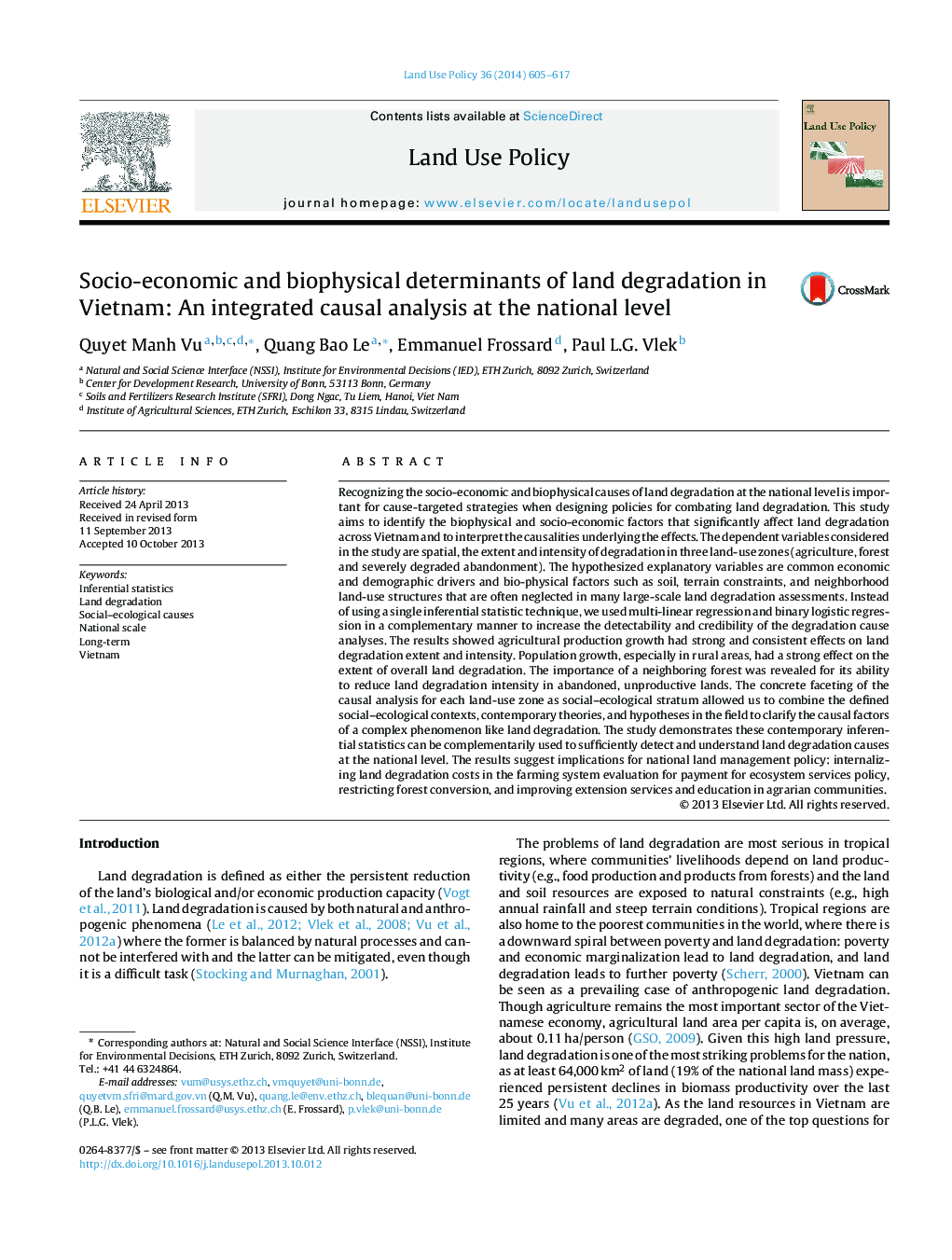| کد مقاله | کد نشریه | سال انتشار | مقاله انگلیسی | نسخه تمام متن |
|---|---|---|---|---|
| 6549060 | 160113 | 2014 | 13 صفحه PDF | دانلود رایگان |
عنوان انگلیسی مقاله ISI
Socio-economic and biophysical determinants of land degradation in Vietnam: An integrated causal analysis at the national level
ترجمه فارسی عنوان
عوامل تعیین کننده اجتماعی و اقتصادی و بیوفیزیکی تخریب زمین در ویتنام: تجزیه و تحلیل یکپارچه علیه در سطح ملی
دانلود مقاله + سفارش ترجمه
دانلود مقاله ISI انگلیسی
رایگان برای ایرانیان
کلمات کلیدی
آمار استنباطی فرسایش زمین، علل اجتماعی-زیست محیطی، مقیاس ملی، طولانی مدت، ویتنام،
ترجمه چکیده
شناخت علل اجتماعی-اقتصادی و بیوفیزیکی تخریب زمین در سطح ملی برای استراتژی های هدفمند در هنگام طراحی سیاست های مبارزه با تخریب زمین مهم است. این مطالعه با هدف شناسایی عوامل بیوفیزیکی و اقتصادی اجتماعی-اقتصادی که بطور قابل توجهی بر تخریب زمین در سراسر ویتنام تأثیر می گذارد و همچنین به توضیح آسیب های زیربنایی آن می پردازد. متغیرهای وابسته مورد مطالعه در این مطالعه فضایی، میزان و شدت تخریب در سه ناحیه کاربری زمین (کشاورزی، جنگل و رهاشدن شدید) است. متغیرهای توضیحی فرض شده، ریسک های اقتصادی و جمعیت شناختی و عوامل زیست فیزیکی مانند خاک، محدودیت های زمین و ساختارهای استفاده از زمین های محصور است که اغلب در بسیاری از ارزیابی های تخریب زمین بسیار مورد توجه قرار می گیرند. به جای استفاده از یک تکنیک آماری استنباطی، از روش رگرسیون چند خطی و رگرسیون لجستیک دوتایی به روش مکمل برای افزایش آشکارسازی و اعتبار تجزیه و تحلیل علل تخریب استفاده شده است. نتایج نشان داد که رشد تولید کشاورزی اثرات قوی و پایدار بر میزان و شدت تخریب زمین دارد. رشد جمعیت، به ویژه در مناطق روستایی، به شدت تحت تأثیر میزان تخریب زمین قرار گرفت. اهمیت یک جنگل همسایه برای توانایی آن در کاهش شدت زمین لرزه در مناطق رها شده و غیر تولیدی نشان داد. مقابله بتن از تجزیه و تحلیل علی برای هر منطقه استفاده از زمین به عنوان طبقه اجتماعی-اکولوژیکی به ما اجازه ترکیب شرایط اجتماعی-محیطی تعریف شده، نظریه های معاصر و فرضیه ها در زمینه را برای روشن شدن عوامل علمی یک پدیده پیچیده مانند تخریب زمین داد. این مطالعه نشان می دهد که این آمار استنباطی معاصر می تواند به طور مکمل مورد استفاده قرار گیرد تا به اندازه کافی کشف و درک علل تخریب زمین در سطح ملی. نتایج نشان می دهد پیامدهای سیاست های ملی مدیریت زمین: درونی کردن هزینه های تخریب زمین در سیستم ارزیابی سیستم کشاورزی برای پرداخت هزینه های سیاست های خدمات اکوسیستم، محدود کردن تبدیل جنگل ها و بهبود خدمات پس از فروش و آموزش در جوامع کشاورزی.
موضوعات مرتبط
علوم زیستی و بیوفناوری
علوم کشاورزی و بیولوژیک
جنگلداری
چکیده انگلیسی
Recognizing the socio-economic and biophysical causes of land degradation at the national level is important for cause-targeted strategies when designing policies for combating land degradation. This study aims to identify the biophysical and socio-economic factors that significantly affect land degradation across Vietnam and to interpret the causalities underlying the effects. The dependent variables considered in the study are spatial, the extent and intensity of degradation in three land-use zones (agriculture, forest and severely degraded abandonment). The hypothesized explanatory variables are common economic and demographic drivers and bio-physical factors such as soil, terrain constraints, and neighborhood land-use structures that are often neglected in many large-scale land degradation assessments. Instead of using a single inferential statistic technique, we used multi-linear regression and binary logistic regression in a complementary manner to increase the detectability and credibility of the degradation cause analyses. The results showed agricultural production growth had strong and consistent effects on land degradation extent and intensity. Population growth, especially in rural areas, had a strong effect on the extent of overall land degradation. The importance of a neighboring forest was revealed for its ability to reduce land degradation intensity in abandoned, unproductive lands. The concrete faceting of the causal analysis for each land-use zone as social-ecological stratum allowed us to combine the defined social-ecological contexts, contemporary theories, and hypotheses in the field to clarify the causal factors of a complex phenomenon like land degradation. The study demonstrates these contemporary inferential statistics can be complementarily used to sufficiently detect and understand land degradation causes at the national level. The results suggest implications for national land management policy: internalizing land degradation costs in the farming system evaluation for payment for ecosystem services policy, restricting forest conversion, and improving extension services and education in agrarian communities.
ناشر
Database: Elsevier - ScienceDirect (ساینس دایرکت)
Journal: Land Use Policy - Volume 36, January 2014, Pages 605-617
Journal: Land Use Policy - Volume 36, January 2014, Pages 605-617
نویسندگان
Quyet Manh Vu, Quang Bao Le, Emmanuel Frossard, Paul L.G. Vlek,
